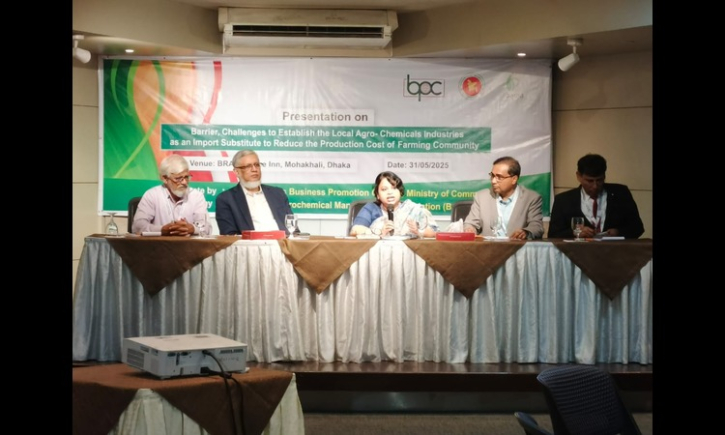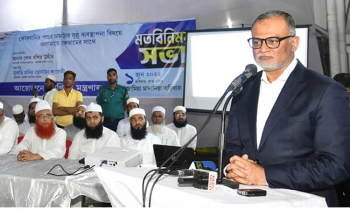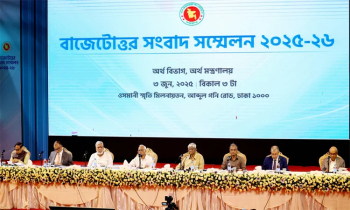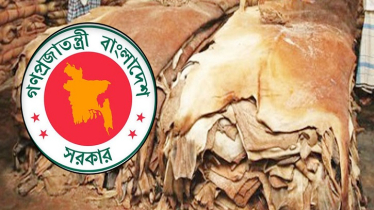
Dhaka: Local producers are advocating for three key benefits to achieve self-sufficiency in agrochemicals: open access to raw material import sources, withdrawal of customs duties on imported chemical auxiliaries, and access to low-interest bank loans and export incentives as a priority sector. This demand was raised by businesses at a workshop titled "Barriers and Challenges to establish the local Agro-chemical industries as an import substitute to reduce the production cost of farming community" held on Saturday (May 31, 2025) at the Brac Inn Centre in Dhaka.
The workshop, chaired by KSM Mostafizur Rahman, President of the Bangladesh Agro-Chemical Manufacturers Association, featured Nahid Afroze, Joint Secretary of the Ministry of Commerce, as the chief guest. Special guests included Dr. Zakir Hossain, Secretary General of the Bangladesh Association of Pharmaceutical Industries, and microbiologist Professor Dr. Anwar Hossain, among others.
Research findings were presented at the workshop by Professor Dr. Abdul Karim of Gazipur Agricultural University, Mujibul Haque, private sector specialist at Solidaridad Network Asia, and Faijul Siddikii, special correspondent of Channel 24.
Speakers at the workshop emphasized the need for policy formulation that prioritizes local producers in the pesticide sector, similar to the pharmaceutical industry, to ensure the sustainability of the country's agricultural sector.
KSM Mostafizur Rahman, President of the Bangladesh Agro-Chemical Manufacturers Association, stated that the Pesticide Technical Advisory Committee (PTAC) has imposed a single country single source provision for importing pesticide raw materials, allegedly influenced by multinational companies. This measure, according to Rahman, aims to prevent local companies from importing raw materials at competitive prices. He claimed that while this benefits multinational companies who import products at higher prices from their own factories in other countries, local companies face difficulties as they cannot import cheaper raw materials and chemicals from other foreign companies.
Rahman further added that the "country of origin" condition has been added to the regulations, in violation of the law, to favor multinational companies. As a result, local companies seeking to import raw materials from different sources must wait at least three to five years, including for field trials.
Mostafizur Rahman proposed opening up raw material and auxiliary chemical import sources for the agro-chemical industry, similar to the pharmaceutical industry, along with withdrawing chemical import duties, and providing low-interest loans and export incentives as a priority sector. He believes that with these facilities, it would be possible to meet domestic demand and export to Asia, Africa, and Central America within three years.
Presenting the main paper, Professor Dr. Abdul Karim of Gazipur Agricultural University, stated that import-substitute local pesticide producers are struggling due to complexities with single source raw materials, lack of raw material production policies, illegal monopoly on patented products, and difficulties in clearing raw materials from ports. Therefore, he recommended abolishing the single source system, implementing patent law and compulsory licensing, restructuring PTAC, and revoking NOCs for raw material imports.
Zakir Hossain, Secretary General of the Bangladesh Association of Pharmaceutical Industries, affirmed that Bangladesh must achieve self-sufficiency in pesticides at any cost, and his association would provide support in this endeavor.
Nahid Afroze, Joint Secretary of the Ministry of Commerce, who was present at the event, assured that the Ministry of Commerce would take necessary initiatives to implement the recommendations made for the development of this sector.
Business leaders reported that the current size of the agro-chemical market in Bangladesh is approximately BDT 7500 crore. Seven multinational companies control over 55% of this market, while 22 local companies control only 6%. The remaining 39% is controlled by 1340 importers.





